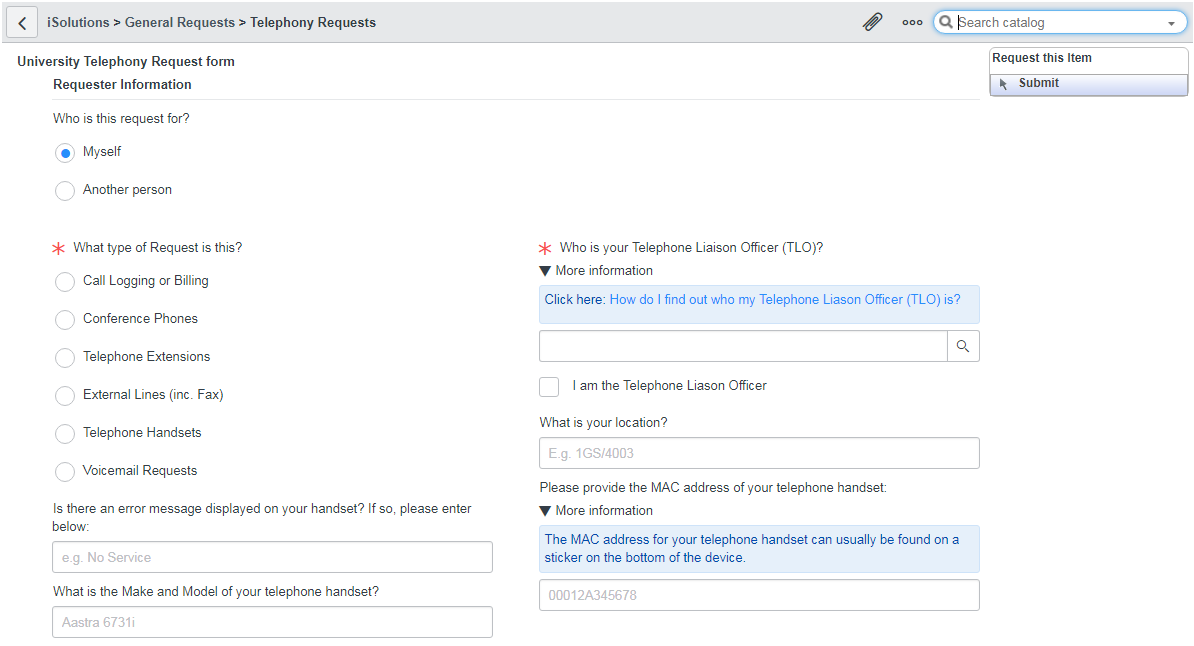In the last 12 months, Service Desk processed 99,687 call records, of which approximately 28% were ‘First time Fulfilment’. Approximately 7% were junk emails, and 7% were updates or chases to existing cases. This means that 58% of incoming call requests were logged as Incidents or Requests.
In many cases, Service Desk are logging the Incident or Request and passing it straight to a second or third line team.
Incidents are used to report an issue or ‘something broken’, so these are less predictable, however Requests can be broken down into common items.
In many cases, Service Desk do not directly fulfill a Request, and merely act as a conduit to pass the Request record to the correct team.
This means that requests made by users are queued awaiting assessment and appropriate routing by a Service desk agent. At times when the Service Desk is very busy (such as around Exam periods or the start of the new Academic Year), a request may wait longer than usual for a Service Desk agent to assess it and pass it straight to another team. Once a request has been passed to the correct team, it will then queue with that team awaiting resource to resolve or fulfill it.
This is a significant area of waste, and contributes to the perception that iSolutions provides a ‘slow’ end-to-end service. The quantity of Requests that are simply ‘passed on’ by the Service Desk also represents a significant workload for the Service Desk that directly impacts waiting times and Service agent availability. By removing some of this administrative overhead, Service Desk are able to focus on serving users.
Improving the rate of turnaround for common requests can be achieved by identifying the common request items, and routing these directly to their fulfilment team, bypassing Service Desk entirely, except where the Service Desk need to make contact with either the customer or another team.
Consulting with the Service Desk, University Telephony is an area they commonly see requests for that are passed straight through to their fulfilment team.
In the last 12 months, 2187 Telephony Requests and Incidents were raised. Of which approximately 1751 were passed on to Telephony Management without Service Desk being involved in their fulfilment. An estimated 436 were ‘First Time Fixes’. This means that only 20% of Telephony incidents and Requests were serviced first time by Service Desk, and the remaining 80% were passed on to another team.
For each ticket that is passed on to another team, the Service Agent spends approximately 1 minute on ‘ticket administration’. Where TLO contact is needed, the Service Agent spends up to 5 minutes. This means that the service desk is spending between 1751 minutes and 8755 minutes (if each passed on ticket required communication to the TLO). The actual value is likely to be somewhere around 5253 minutes (the median value).
Service Agents cost the business between £13.20 per hour and £15.78 per hour.
The potential costs of this waste can be broken down as:
|
£13.20 ph £0.22 per minute |
£15.78 ph £0.263 per minute |
|
|
1751 Minutes (29 hours 11 Minutes) |
£385.22 |
£460.51 |
|
5253 Minutes (87 Hours 33 Minutes) |
£1155.66 |
£1239.71 |
|
8755 Minutes (145 hours 55 minutes) |
£1926.10 |
£2302.57 |
Conservatively, this waste has a value of up to £460.51, but if we assume the wasted minutes are closer to 5253, then this waste costs the business up to £1239.71. Potentially this waste could be costing the business up to £2302.57 per year in wasted Service Agent hours processing requests that could be easily routed to their correct team.
To facilitate this, we have created a ‘University Telephony Request’ form that can be used to request the most common University Telephony services.
This form will route Telephony requests to the correct team based firstly on the type of request, and secondly based on whether Telephone Liaison Officer Approval is required.
If the user completing the form is the TLO, then no further authorisation will be required, so this request will be directed immediately to the appropriate support team. If additional TLO approval is needed, the user will need to nominate their TLO who will be sent an approval request. Once approval has been received, the request will be directed to the correct team for action.
Our aims with this project were to give users and TLO’s a single point of contact for their Telephony-related requests (incidents will still follow the standard process). By doing this, we aim to reduce the number of requests that await Service Agent processing by 90%.
By directing requests to the correct team as early as possible, we aim to improve delivery time by at least 1 business day (08:00-18:00 – 36000 seconds) as this represents the time this ticket may have waited for Service Agents to process it and pass it to the correct team.
The form can be found on the ServiceLine Self Service Portal under ‘IT Requests’.

